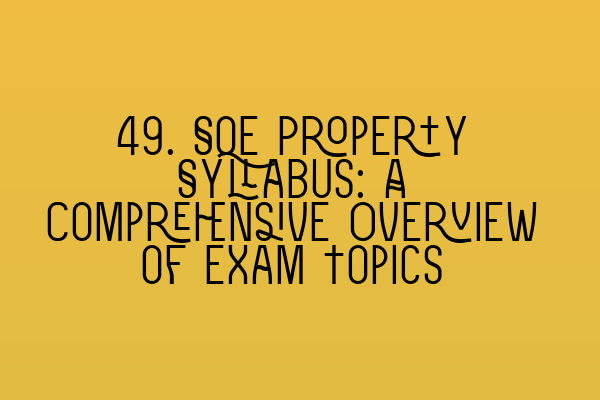SQE Property Syllabus: A Comprehensive Overview of Exam Topics
Are you preparing for the SQE Property Law & Land Law exam? To succeed in this challenging assessment, it’s essential to have a thorough understanding of the exam topics and the key areas to focus on. In this blog post, we will provide you with a comprehensive overview of the SQE Property syllabus, breaking down the important exam topics and discussing key points to help you prepare effectively.
1. Introduction to SQE Property Law & Land Law Exam
The SQE Property Law & Land Law exam is designed to test your knowledge and understanding of property law and various aspects of property ownership and transactions. It covers both residential and commercial property and includes topics such as freehold and leasehold estates, co-ownership, easements, mortgages, and landlord-tenant relationships.
By familiarizing yourself with the exam syllabus, you can ensure that you are fully prepared to tackle the questions and demonstrate your expertise in property law. Let’s delve into the specific topics covered in the SQE Property exam:
2. Freehold and Leasehold Estates
Freehold and leasehold estates are fundamental concepts in property law. The exam will assess your understanding of the differences between these two forms of property ownership, including the rights and responsibilities of freeholders and leaseholders.
It is crucial to grasp concepts such as the duration of leases, the creation and termination of leases, and the rights and obligations of both landlords and tenants in leasehold arrangements. A deep understanding of the legal principles governing these estates will be crucial to answering exam questions accurately.
3. Co-ownership
Co-ownership refers to situations where two or more people jointly own a property. The exam will examine your knowledge of the different forms of co-ownership, such as joint tenancy and tenancy in common, and the respective rights and obligations of co-owners.
Topics such as the creation and termination of co-ownership agreements, the rights of co-owners in respect of the property, and the procedures for resolving disputes among co-owners are likely to be covered in the exam. Make sure you are well-versed in these areas to score high marks.
4. Easements
An easement is a legal right that one person has to use another person’s land for a specific purpose. Understanding the creation, scope, and enforcement of easements is essential for success in the SQE Property exam.
Key concepts to be familiar with include the different types of easements, such as rights of way, rights of light, and rights to drainage, as well as the methods by which easements can be created and terminated. You should also be able to analyze scenarios involving conflicting easements and determine the appropriate legal remedies.
5. Mortgages
Mortgages are a common method of financing property purchases. The exam will likely include questions on the nature and creation of mortgages, as well as the rights and duties of both mortgagors and mortgagees.
You should be well-versed in topics such as the legal formalities required for creating a mortgage, the different types of mortgages, the consequences of defaulting on mortgage payments, and the procedures for enforcing mortgage rights. Understanding mortgage law will be crucial to answering questions accurately and comprehensively.
6. Landlord-Tenant Relationships
The relationship between landlords and tenants is governed by a complex body of law. The SQE Property exam may explore various aspects of this relationship, including the creation and termination of tenancies, rent control, repairs and maintenance obligations, and eviction procedures.
Familiarize yourself with the legal rights and obligations of both landlords and tenants, as well as the procedures and legal remedies available to each party in the event of a dispute. Gaining a thorough understanding of landlord-tenant law will be instrumental in securing a strong performance on the exam.
Summary
The SQE Property Law & Land Law exam is an important step in your journey toward becoming a qualified solicitor. To succeed in this assessment, it is crucial to thoroughly understand the exam topics and be prepared to answer questions on a variety of property law issues.
In this blog post, we have provided you with a comprehensive overview of the SQE Property syllabus, covering key topics such as freehold and leasehold estates, co-ownership, easements, mortgages, and landlord-tenant relationships. By focusing on these areas and building a solid understanding of the underlying legal principles, you will be well-equipped to tackle the exam questions confidently and effectively.
To further enhance your preparation, we recommend checking out these related articles:
- SQE 1 Practice Exam Questions
- SQE 1 Practice Mocks FLK1 FLK2
- SQE 2 Preparation Courses
- SQE 1 Preparation Courses
- SRA SQE Exam Dates
We wish you the best of luck in your SQE Property Law & Land Law exam preparation! Remember, thorough knowledge and effective revision are the keys to success.
